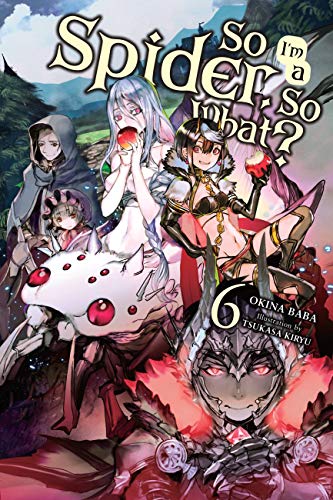By Okina Baba and Tsukasa Kiryu. Released in Japan as “Kumo Desu ga, Nani ka?” by Kadokawa Books. Released in North America by Yen On. Translated by Jenny McKeon.
(Note: This review, especially towards the end, gets more spoilery than usual as you can’t not talk about the end.)
I have to admit that “they battle a bunch of fighter jets in order to infiltrate a UFO with tanks and robots” was not really the plot I was expecting when I picked up the seventh volume of Spider So What. But, having finished the volume, I can’t say I’m too disappointed in it. We’ve seen robots and cyborgs in this series before, of course. It also helps to show off the true arrogant brokenness of Potimas, who manages to be an evil elf while at the same time being an embarrassed chuuni who can’t bear to see people using his old design specs that he made back in the day. There is not one moment in this book where you like him, and the relationship between him, White, and the Demon Lord helps to remind us that the “truce” between the later two is miles and miles ahead of the loathing and antipathy they feel for Potimas. They might even be… friends?
After accidentally freeing two world-killing pieces of tech from an underground bunker simply because of her insatiable curiosity, White and the rest of her merry band have to join forces to destroy it. Unfortunately, this means joining forces with Potimas, whose designs they’re based on, as well as the Pontiff and a group of local dragons. Most of the book is spent on the battle, with White’s chatterbox narrative voice, constantly belittling and mocking herself and showing self-doubt at every confrontation contrasting with how everyone ELSE sees her, which is to say an emotionless, morally ambiguous nightmare who is STILL GETTING STRONGER. There’s a lovely moment where White is in a fury and the Demon Lord wraps her in thread to stop her. White immediately teleports out of it, and while she’s calm again, she notes offhandedly the Demon Lord looks super surprised but doesn’t get why. This push and pull on her character is one reason this series works.
Then we get to the climax of the book, where the Demon Lord, Potimas, and White are faced with a bomb that is about to explode. There are really very few options that are available. Still, I suspect only White could come up with “swallow the bomb”, which causes a Daffy Duck-esque explosion but does not, remarkably, kill her off. Good thing too, as Vol. 8 is due in the spring. What’s more, she has now leveled up to the point where the “game system” part cannot help her anymore… she’s a god. “D” helpfully explains this, and decides to give her another name: Shiraori, which I will start using in future. (Notably, “D” does not suggest calling her “Wakaba”, supposedly her old name from Earth, and refers to her as “nameless spider”. This feels very much like ominous foreshadowing.) As a God, Shiraori as all the power she used to and more… but has to learn how to do everything without the “game world” help. Including walking on her new human legs. To her, this is very much “restarting from zero”.
So overall, a solid book of fighting, but the last fifth or so is dynamite (literally), with one revelation after the other. I can’t wait to see where things go next. (Also, when will we catch up to the other kids?)




